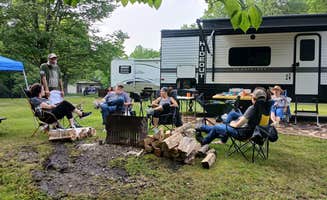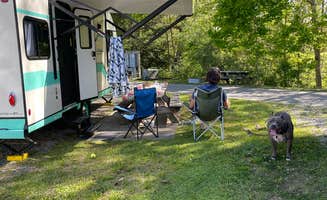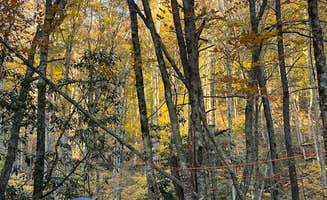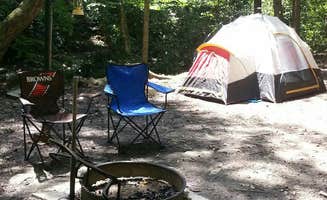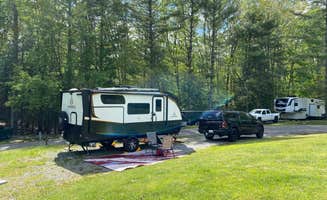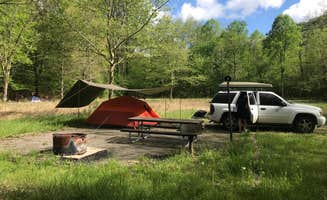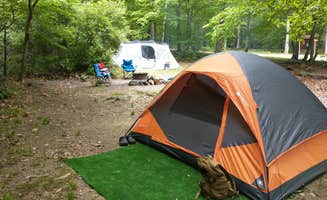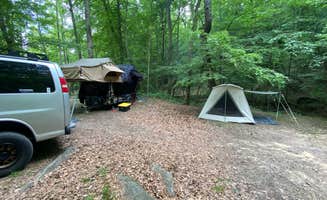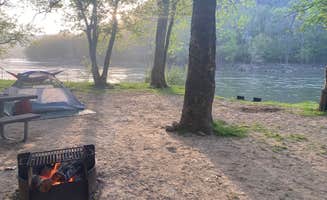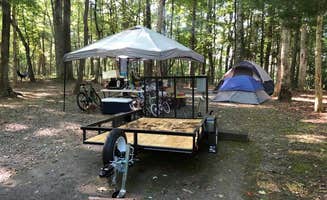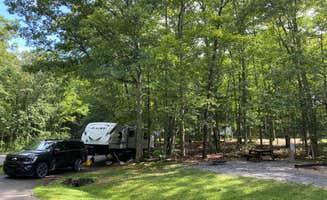Camping spots near Saulsville, West Virginia are situated in the rugged terrain of southeastern West Virginia, where elevations range from 1,500 to 3,200 feet throughout the region. The area experiences significant seasonal temperature variations, with summer highs averaging 85°F and winter lows frequently dropping below freezing. Many campgrounds in this Appalachian region are situated along waterways, with the New River and its tributaries creating natural boundaries between campsites and providing natural white noise for overnight stays.
What to do
Hiking waterfall trails: Twin Falls Resort State Park Campground offers multiple waterfall-accessible trails of varying difficulty. According to Tom H., "Very well documented and marked hiking trails. Very cool pioneer house with garden and rescue animals and (at least during my time there) LOTS OF DEER!!!"
Water recreation: Lake Stephens Campground provides lake access with swimming and fishing opportunities. Mark K. notes, "The roads and views of the lake are beautiful. I recommend this campground."
Coal mining history: The region's industrial past is accessible through educational sites. As one visitor to Beckley Exhibition Coal Mine Campground suggests, "Check out the Beckley Exhibition Coal Mine...and while you're there, take a tour of the mine, museum, and associated villages (both a coal town and an earlier pioneer community)."
Off-road trail riding: Several campgrounds provide direct access to ATV trail systems. A visitor to Hilltop Escape LLC reports, "The campground is literally on several trails. Restaurant on-site. From breakfast to supper."
What campers like
Riverside campsites: Many campers appreciate direct water access. At Army Camp, one reviewer notes, "It's hard to beat a free campsite right on the river. I enjoyed evening river dips before bed."
Dark night skies: The rural location limits light pollution. According to Linda R. at Hilltop Escape, "The stars from the mountaintop at night are amazing."
Wildlife viewing: Twin Falls Resort State Park Campground receives high marks for animal sightings. Tiffany A. mentions, "This park has surprised us every single day. They have an abundance of trails with varying difficultly levels. We were here for almost a week and had the time only to get in about half of them."
Free camping options: Glade Creek Campground and other New River Gorge sites offer no-cost camping. As Dave V. states, "The price can't be beat-Free! Maximum length of stay is 14 days. There is definitely enough to see and do to fill 14 days!"
What you should know
Weather impacts: Rain events affect river campgrounds significantly. At Glade Creek, one camper observed, "During our visit, in early May, it had been and was still experiencing heavy rains and flooding."
Cell service limitations: Most campgrounds have minimal connectivity. Nicole M. notes at Mash Fork Campground, "No service for Verizon users... Sites have wifi but I could only get it to work 20% of the time."
Availability challenges: Competition for sites can be intense during peak seasons. A Lake Stephens visitor mentioned, "Hard to get a spot but if you do you will love it!"
Train noise: Some riverside campgrounds experience rail noise. One Grandview Sandbar visitor reports, "The really bad thing is that there is a train station directly across the river. And trains will and do pull through every couple of hours 24/7."
Tips for camping with families
Playground access: Multiple campgrounds feature play areas. A Lake Stephens reviewer mentions, "The common area in the middle has a playground, restroom/showers, vending machines and some field area to play."
Seasonal activities: Some parks organize regular community events. As one visitor notes, "They have regularly scheduled events like movie night, and they even host a 'trick-or-treat' event each year that attracts hundreds."
Wildlife education: Mash Fork Campground — Camp Creek State Park offers nature viewing opportunities. Dawn M. shared, "The falls are easily accessible and were beautiful even without an abundance of water. Very relaxing stay."
Trail difficulty awareness: Families should research trail ratings before hiking. Julie B. notes, "The hiking is difficult in some areas but spectacularly beautiful."
Tips from RVers
Road conditions: Mountain roads present challenges for larger vehicles. Austin-Tarra G. advises, "Make sure your truck/vehicle towing is not underrated for what you're pulling as it is a lot of big uphill elevation and tons of windy roads and tight turns."
Site leveling: Many campgrounds have uneven terrain. At Little Beaver State Park Campground, Adam and Suzanne B. observed, "Many sites looked like it may take some work to get level. We were in site 20 with a 23 ft TT and got level fairly easily but a longer rig may have difficulty in that site."
Dump station access: Alternative arrangements may be needed for sewage. One camper noted, "They do not have sewage hookups, so prepare accordingly."
Site selection strategy: Some campgrounds offer significantly different experiences based on site location. Chris T. from Twin Falls states, "Sites are reasonably spaced. Some are wooded, others are out in open."


